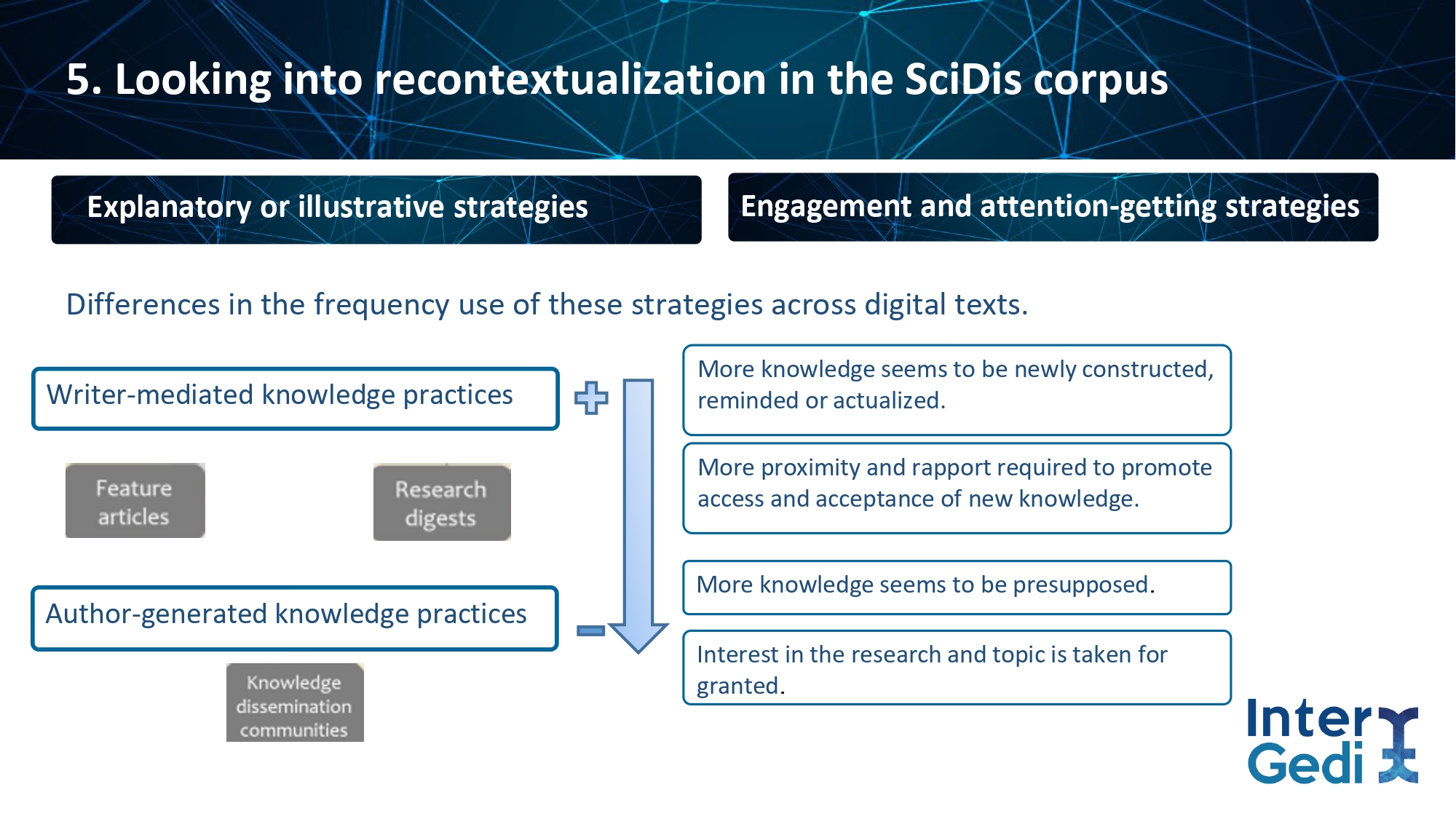10th Brno Conference on Linguistic Studies in English: Pilar Mur Dueñas’ plenary talk on digital dissemination practices

In her plenary talk, titled “Scientists’ digital dissemination practices: A look into the recontextualization of specialised knowledge”, Dr Mur-Dueñas shed light into the process of digital scientific dissemination of knowledge exploring some of discursive, communicative phenomena through evolving digital texts, genres and practices. She explained the SciDis approach to recontextualization as a cognitive and discursive process of transformation of disciplinary knowledge through varied features and semiotic resources. She also presented our database and a preliminary analysis of explanatory and engagement strategies in a section of the SciDis corpus. Her preliminary results show differences in the frequency use of these strategies across the digital texts analysed. Finally, she has stressed that the Web 2.0, Science 2.0 and Scholarship 2.0, which has revolutionised how we create, share and communicate specialised knowledge requires further analyses of evolving, emerging and reconfigured digital discursive practices.
The full abstract of Pilar Mur-Dueñas’ talk can be consulted as follows:
Scientists’ digital dissemination practices: A look into the recontextualization of specialised knowledge
Researchers and scientists are increasingly encouraged by their institutions, by external organizations and by societal demands to foster the global dissemination of their knowledge production. Such dissemination is nowadays very frequently carried out online through different digital practices and texts, and responds to calls to open science up, to empower citizens, and to prompt their participation in scientific matters. The current Web 2.0 and Science 2.0 context in which we are immersed requires complex discursive practices to recontextualize and communicate specialised knowledge in a way that is accessible, understood and accepted by multiple audiences, ranging from experts in their own and other disciplines to a relatively uninformed general public.
Previous research has pointed out different strategies used in the recontextualisation of scientific knowledge. Two types of strategies have been discerned as especially salient: explanatory or illustrative strategies and engagement or attention-getting strategies (e.g. Luzón, 2013, 2019; Calsamiglia and VanDijk, 2004; Gotti 2004; Bondi et al, 2015; Carter Thomas and Rowley-Jolivet 2020; Bondi and Cacchiani, 2021; Lorés 2023). These strategies are verbally and non-verbally realised. To instantiate them diverse semiotic modes (especially visual and spatial) and specific digital affordances can be resorted to.
It is the aim of my talk (i) to focus on research which has unveiled digital practices commonly employed by scientists to globally disseminate knowledge, (ii) to identify and discuss digital medium affordances and aspects which have a bearing on how specialized knowledge is recontextualized to be communicated, and (iii) to illustrate how explanatory or illustrative strategies and engagement or attention-getting strategies are used in a section of our SciDis (Scientific Dissemination) corpus compiled by the InterGEDI research group, in particular, when knowledge on circular economy and sustainability is disseminated through diverse digital practices and texts.
Overall, a glimpse of the discursive challenges that digital global dissemination has brought about for scientists and mediators will be given, and some reflections on the ensuing challenges for discourse analysts when we look beyond the surface of the text will be shared.
References
Bondi, M., & Cacchiani, S. 2021. Knowledge communication and knowledge dissemination in a digital world. Journal of Pragmatics 186: 117-123.
Bondi, M., Cacchiani, S., & Mazzi, D. (Eds.). 2015. Discourse in and through the media: Recontextualizing and reconceptualizing expert discourse. Cambridge Scholars Publishing.
Carter-Thomas, S., & Rowley-Jolivet, E. 2020. Three Minute Thesis presentations: Recontextualisation strategies in doctoral research. Journal of English for Academic Purposes 48(1).
Calsamiglia, H., & Van Dijk. T.A. 2004. Popularization discourse and knowledge about the genome. Discourse and Society 15(4): 369-389.
Gotti, M. 2014. Reformulation and recontextualization in popularization discourse. Ibérica 27: 15-34.
Lorés, R. 2023. Dual voices, hybrid identities: the recontextualization of research in digital dissemination scientific discourse. Círculo de Lingüística Aplicada a la Comunicación 93: 69-84.
Luzón, M.J. 2013. Public communication of science in blogs: Recontextualizing scientific discourse for a diversified audience. Written Communication 30(4): 428-457. Luzón, M.J. 2019. Bridging the gap between experts and publics: the role of multimodality in disseminating research in online videos. Ibérica 37: 167-192.
